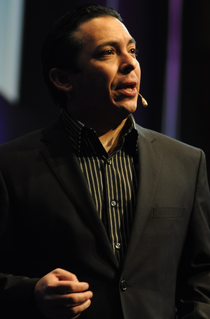A Quote by William A. Dembski
As far as design theorists are concerned, theistic evolution is American evangelicalism's ill-conceived accommodation to Darwinism .
Related Quotes
The first point one has to get straight in discussions like this, is that ID is not the opposite of evolution. Rather, it is the opposite of Darwinism, which says life evolved by an utterly unguided, undirected mechanism. If god directed the process of evolution, or rigged the universe to produce complex life, then that is not Darwinism - it is intelligent design.
Darwinian evolution is slow and gradual, step by step. Such an evolution can explain micro-evolution but not macro-evolution. For example, how did the eye evolve? The idea behind Darwinism is that organisms adapt, and that nature selects only those genetic changes which are the mutations that serve a good purpose for adaptation. So taken this way, the eye cannot develop gradually because one-thousandth or one-millionth of an eye would be of no value for survival. So generally this question rules out Darwinism as an adequate theory for macro-evolution.
Creationists have also changed their name ... to intelligent design theorists who study 'irreducible complexity' and the 'abrupt appearance' of life-yet more jargon for 'God did it.' ... Notice that they have no interest in replacing evolution with native American creation myths or including the Code of Hammarabi alongside the posting of the Ten Commandments in public schools.
The new advocates of ID [Intelligent Design] ask that their ideas be judged by scientific, not religious, criteria. OK, let's see how well ID stacks up as a scientific alternative to Darwinism. To gauge how well ID is doing as a platform for scientific research, I logged into the best database of the biological literature. A search for keyword ''evolution'' yielded 24,000 hits in the last decade. A search for ''intelligent design'' yielded not a single piece of research. Evolution by natural selection remains the basis of every successful biological research program.
Throughout his last half-dozen books, for example, Arthur Koestler has been conducting a campaign against his own misunderstanding of Darwinism. He hopes to find some ordering force, constraining evolution to certain directions and overriding the influence of natural selection. [...] Darwinism is not the theory of capricious change that Koestler imagines. Random variation may be the raw material of change, but natural selection builds good design by rejecting most variants while accepting and accumulating the few that improve adaptation to local environments.
In many ways, American evangelicalism is somewhat stronger today than it was in, say 1955 - certainly more mainstream and influential in the culture as a whole. But, the increased strength of evangelicalism hasn't increased fast enough to compensate for the total collapse of mainline Protestantism and the pretty steady weakening of my own Roman Catholic Church.
My feeling is that Darwinism is only at best a partial solution, and an extremely dangerous partial solution. I would say, based on the little I know, Darwinism explains microevolution within species quite well. As to its broader consequence and implications, I don't think it explains individual species evolution at all well.
As far as sacred Scripture is concerned, however much froward men try to gnaw at it, nevertheless it clearly is crammed with thoughts that could not be humanly conceived. Let each of the prophets be looked into: none will be found who does not far exceed human measure. Consequently, those for whom prophetic doctrine is tasteless ought to be thought of as lacking taste buds.








































